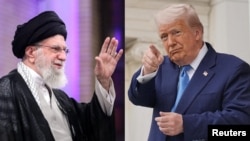As the fifth round of nuclear talks between Iran and the United States wrapped up in Rome earlier this month, the public saw little sign of breakthrough.
But there have been reports about proposals to break the deadlock as Washington is insisting Iran give up uranium enrichment and Tehran rejecting the demand altogether.
Iranian Foreign Minister Abbas Araqchi, who leads Tehran's negotiating team in the talks, told state media that Iran is reviewing proposals by Omani mediators but did not disclose any details.
Oman's Pitches
Araqchi briefed the parliamentary National Security and Foreign Policy Committee on May 25, shortly after the latest round of talks concluded in Rome.
Ahmad Bakhshayesh Ardestani, a lawmaker and member of the committee, told Iranian media after the briefing that the Omanis had tabled two proposals.
One suggestion is that Iran suspend its uranium enrichment activities for six months and resume them later. Ardestani said Iran "has not accepted" the proposals.
He said Iran worries that by giving in to the demand, it will encourage the United States to ask for more concessions.
Another proposal is the formation of a regional nuclear consortium that would enhance oversight of Iran's nuclear activities and reassure the West that Iran remains within agreed enrichment levels.
The proposal was initially reported by Iranian media to have come from Tehran, but Foreign Ministry spokesman Esmail Baqaei denied this.
"This wasn't Iran's proposal," he told reporters, though he added Tehran would "welcome" the idea, "so long as it does not replace Iran's right to enrich uranium on its own soil."
The consortium could potentially include US involvement, and Iran's nuclear energy chief Mohammad Eslami on May 28 suggested Tehran would be open to accrediting Americans inspectors working under the International Atomic Energy Agency (IAEA).
"If there is an agreement, there is a possibility that American inspectors will be allowed access to Iranian nuclear facilities," he said.
Critics argue Tehran is using the offer to pressure Washington into softening its stance on enrichment.
"For the moment, the jury is still out. We don't know whether there's going to be an agreement or not," IAEA chief Rafael Grossi told journalists attending a weeklong seminar at the agency in Vienna on May 28.
Flexibility On Enrichment?
The debate over uranium enrichment has become a matter of national pride and identity for Iran. Araqchi has argued the Islamic republic has paid too high a price -- namely losing several nuclear scientists to assassinations -- to simply abandon its enrichment program.
The administration of US President Donald Trump maintains that Iran must cease all enrichment activities, a position US Special Envoy Steve Witkoff recently defended as essential "because enrichment enables weaponization."
Secretary of State Marco Rubio echoed that stance during a recent Senate hearing, declaring that "any level of domestic enrichment is unacceptable and poses a direct threat."
Iran, however, remains defiant.
Supreme Leader Ayatollah Ali Khamenei has dismissed Washington's demands as "outrageous" and "nonsense," while Araqchi has vowed that Iran will continue enriching uranium "with or without a deal."
Alan Eyre, a distinguished diplomatic fellow at the Middle East Institute and former Persian-language spokesman for the US State Department, says the Trump administration has a pattern of starting with a hard-line stance but eventually settling for compromise and "declaring victory."
"It's possible that the United States will reconsider its red lines," he told RFE/RL's Radio Farda.
Since Trump withdrew from the 2015 nuclear deal during his first term and reimposed sanctions, the Islamic republic has significantly expanded its nuclear program.
Iran insists its nuclear program is peaceful and denies pursuing a bomb.
However, it is now enriching uranium to 60 percent purity, which is well above the 3.67 percent cap set by the 2015 accord and close to weapons-grade levels.
Despite a languishing economy and weak currency, Iran's President Masud Pezeshkian asserted on May 26 that the country will do fine even without an agreement.
"It's not as if we'll die of hunger if they refuse to negotiate with us and impose sanctions. We will find a way," he said.
But Iran could be facing more sanctions and even military action in the absence of a deal. European powers have threatened to reimpose UN sanctions against Tehran if it fails to reach an agreement with Washington by the end of June, while US intelligence suggest Israel is preparing to hit Iranian nuclear sites.
Axios reports that Trump has warned Israeli Prime Minister Benjamin Netanyahu against taking any action that would undermine diplomacy with Iran, though the US president himself has not taken military action off the table if talks collapse.
With no date set for the next round of talks, the path forward remains uncertain -- and the longer the stalemate drags on, the greater the risk that diplomacy gives way to escalation.











